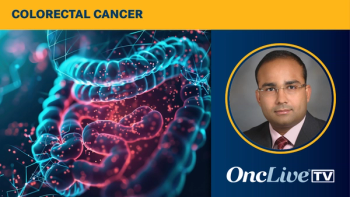
RAS Mutation Status in Colorectal Cancer
The molecular pathology must be considered when determining optimal treatments for individuals with colorectal cancer, says Volker Heinemann, MD, as those with RAS wild-type disease are likely to receive an EGFR-based therapy, such as cetuximab or panitumumab, in addition to their combination chemotherapy regimen, such as FOLFOX or FOLFIRI. Clinical trials have demonstrated that the addition of anti-EGFR therapy in individuals with RAS wild-type tumors significantly prolongs overall survival, states Marwan Fakih, MD. However, there is unclear evidence supporting a specific sequence of anti-EGFR therapy in the first-, second-, and third-line disease settings.
Phase III clinical trials, namely FIRE-3 and CALGB 80405, have demonstrated that patients with RAS wild-type CRC who received combination chemotherapy with anti-EGFR therapy had a deeper clinical response compared with those who received chemotherapy and bevacizumab, states Fakih. Although the studies did not find a survival benefit with the chemotherapy/EGFR-inhibitor combination, this deeper clinical response could impact the resectability of the disease.
In the large 80405 study, among patients with RAS wild-type CRC the median overall survival was 31.2 months with chemotherapy plus bevacizumab and 32.0 months with chemotherapy plus cetuximab. Additionally, a difference was not noted in disease-free survival and progression-free survival. However, more patients treated with cetuximab had no evidence of disease following surgery.
Individuals positive for a RAS mutation do not benefit from anti-EGFR therapy and typically receive antiangiogenic agents in combination with chemotherapy as first-line and second-line treatment. The BRAF-positive population is a small group that typically exhibits more refractory disease, says Fakih. These individuals typically require aggressive chemotherapy and would benefit from enrolling in clinical trials, comments Fakih.



































